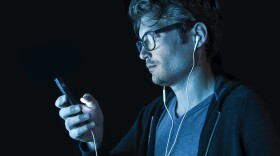
Laura Sydell
Laura Sydell fell in love with the intimate storytelling qualities of radio, which combined her passion for theatre and writing with her addiction to news. Over her career she has covered politics, arts, media, religion, and entrepreneurship. Currently Sydell is the Digital Culture Correspondent for NPR's All Things Considered, Morning Edition, Weekend Edition, and NPR.org.
Sydell's work focuses on the ways in which technology is transforming our culture and how we live. For example, she reported on robotic orchestras and independent musicians who find the Internet is a better friend than a record label as well as ways technology is changing human relationships.
Sydell has traveled through India and China to look at the impact of technology on developing nations. In China, she reported how American television programs like Lost broke past China's censors and found a devoted following among the emerging Chinese middle class. She found in India that cell phones are the computer of the masses.
Sydell teamed up with Alex Bloomberg of NPR's Planet Money team and reported on the impact of patent trolls on business and innovations particular to the tech world. The results were a series of pieces that appeared on This American Life and All Things Considered. The hour long program on This American Life "When Patents Attack! - Part 1," was honored with a Gerald Loeb Award and accolades from Investigative Reporters and Editors. A transcript of the entire show was included in The Best Business Writing of 2011 published by Columbia University Press.
Before joining NPR in 2003, Sydell served as a senior technology reporter for American Public Media's Marketplace, where her reporting focused on the human impact of new technologies and the personalities behind the Silicon Valley boom and bust.
Sydell is a proud native of New Jersey and prior to making a pilgrimage to California and taking up yoga she worked as a reporter for NPR Member Station WNYC in New York. Her reporting on race relations, city politics, and arts was honored with numerous awards from organizations such as The Newswomen's Club of New York, The New York Press Club, and The Society of Professional Journalists.
American Women in Radio and Television, The National Federation of Community Broadcasters, and Women in Communications have all honored Sydell for her long-form radio documentary work focused on individuals whose life experiences turned them into activists.
After finishing a one-year fellowship with the National Arts Journalism Program at Columbia University, Sydell came to San Francisco as a teaching fellow at the Graduate School of Journalism at University of California, Berkeley.
Sydell graduated Magna Cum Laude with a bachelor's degree from William Smith College in Geneva, New York, and earned a J.D. from Yeshiva University's Cardozo School of Law.
-
Nearly half of American adults have been entered into law enforcement facial recognition databases, a new report shows. But problems with the accuracy of the technology could affect innocent people.
-
We pitted two political pundits against an algorithm to compete at predicting the biggest issues to arise over a month in the presidential election. Now we find out who won.
-
Disney, Google and others are said to be considering buying Twitter. It's got baggage — lackluster ad sales, abusive trolling — but also millions of users. What if Twitter focused on a public mission?
-
The next iPhone, expected to be unveiled Wednesday, may be missing something familiar: the ubiquitous headphone jack. Usability experts say the change could really sit badly with Apple customers.
-
The company says it will lay off 5,500 employees and, like other Silicon Valley pioneers, move into different types of business.
-
Delta's massive outage wasn't the first malfunction to wreak havoc on an airline. The industry's systems are complex and require high security, which can make them more prone to shutdowns.
-
Two bodybuilders go at it in a legal battle that reveals how university patents for federally funded research can end up in unexpected places.
-
Millions of video game fans have created a new kind of celebrity — gamers who play live while others watch online. NPR looks at the biggest video game trade conference, known as E3, through the eyes of two of these celebrities.
-
There were signs that E3's organizers were trying to bridge the contradictions between violent video games and the Orlando massacre. "Shooter games" are a significant part of the industry's sales.
-
"We shouldn't need to know they have a disability. It should just work for them."








